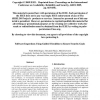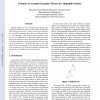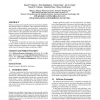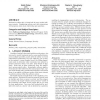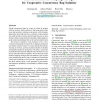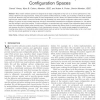RE
2010
Springer
14 years 8 months ago
2010
Springer
Self-adaptation is imposing as a key characteristic of many modern software systems to tackle their complexity and cope with the many environments in which they can operate. Self-a...
141
click to vote
IEEEARES
2009
IEEE
14 years 11 months ago
2009
IEEE
Security is a crucial issue in many modern software systems and can lead to immense costs if required security goals are not fulfilled. Fewer techniques exist to address the syste...
127
click to vote
ICSE
2009
IEEE-ACM
14 years 11 months ago
2009
IEEE-ACM
Modern software systems should be more and more designed with adaptation and run-time evolution in mind. But even with good reactions to changes, the triggered adaptation should b...
SIGSOFT
2010
ACM
14 years 12 months ago
2010
ACM
Software construction has typically drawn on engineering metaphors like building bridges or cathedrals, which emphasize architecture, specification, central planning, and determin...
SIGSOFT
2010
ACM
14 years 12 months ago
2010
ACM
Declarative policies play a central role in many modern software systems. Engineering policies and their interactions with programs raises many interesting open questions. Categor...
112
click to vote
OOPSLA
2010
Springer
15 years 15 days ago
2010
Springer
Fixing concurrency bugs (or crugs) is critical in modern software systems. Static analyses to find crugs such as data races and atomicity violations scale poorly, while dynamic a...
134
click to vote
WCRE
2003
IEEE
15 years 7 months ago
2003
IEEE
Many modern software systems are often large, distributed, written in more than one programming language, and developed using pre-built components. This paper presents the results...
102
click to vote
ICAISC
2004
Springer
15 years 7 months ago
2004
Springer
The advent of the Internet has strongly influenced modern software systems. Existing intranet solutions are being gradually replaced with www services available everywhere and at ...
104
click to vote
ISSTA
2004
ACM
15 years 7 months ago
2004
ACM
—Many modern software systems are designed to be highly configurable so they can run on and be optimized for a wide variety of platforms and usage scenarios. Testing such systems...

